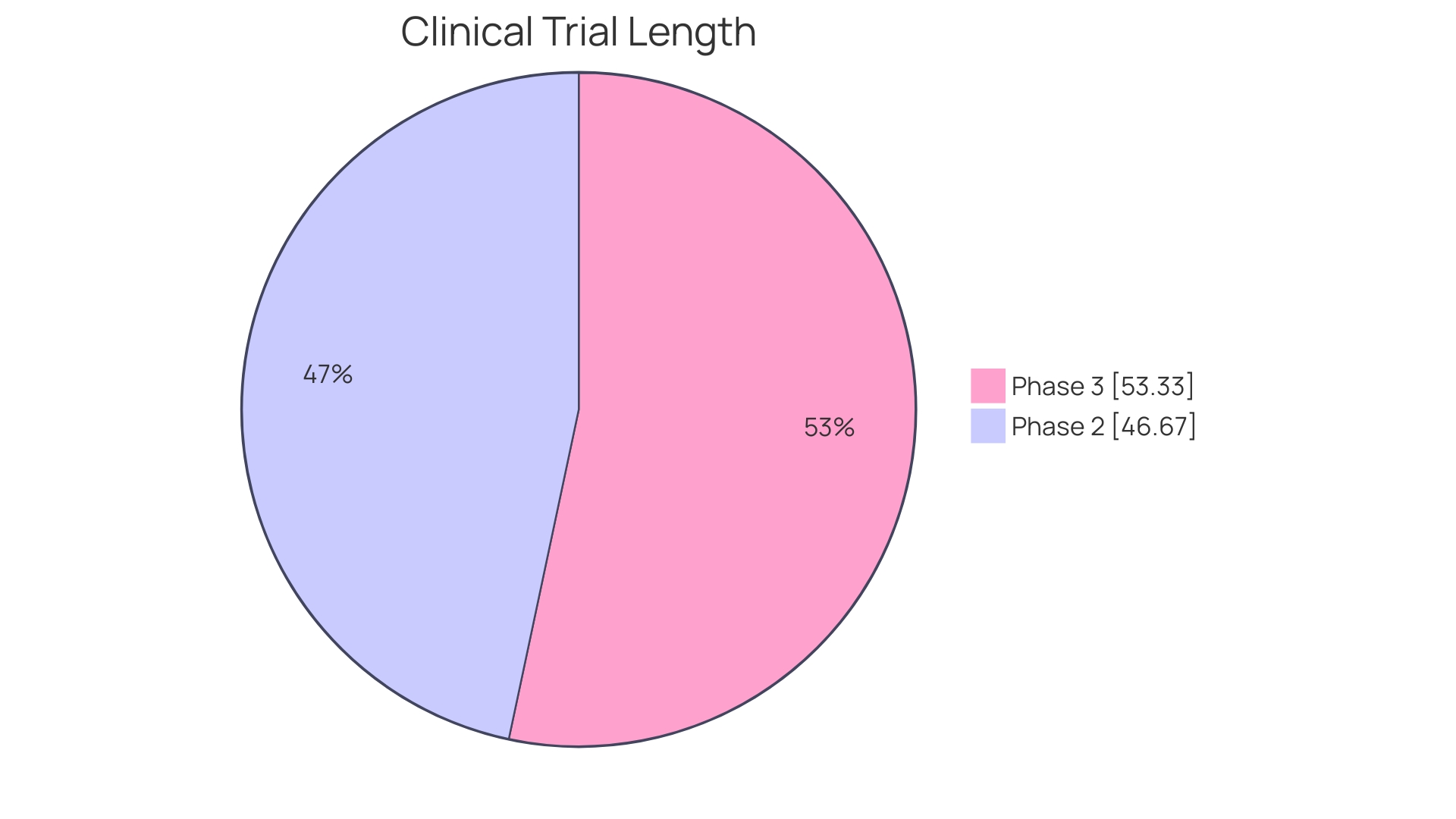Introduction
Clinical trials play a pivotal role in advancing medical research by evaluating the safety and effectiveness of new medical strategies. From medications to procedural methods, rigorous scientific research involving human subjects provides essential data on efficacy, side effects, and proper dosing. The evolution of clinical study enrollment has made it easier for patients to find and join trials, but challenges still exist, such as cost and logistics.
Despite these hurdles, the call for improved integrity and better-quality trials continues to ensure that truly beneficial treatments reach the market. In this article, we explore the importance of clinical trials, the responsibilities of clinical trial consultants, effective marketing strategies, successful case studies, as well as the challenges faced and solutions in clinical trials management. Join us as we delve into the world of clinical trials and their significant impact on medical research and patient outcomes.
The Importance of Clinical Trials in Medical Research
Clinical trials are pivotal in the progression of medical research, allowing for the examination of new medical strategies' safety and effectiveness—spanning from medications to procedural methods. The rigor of scientific research involving human subjects provides essential data regarding efficacy, side-effects, and proper dosing. For instance, consider a prostatectomy where common practice is combined with random trials to fine-tune surgical techniques.
All patients, even those enrolled in the study, submit baseline health information, which then becomes part of their medical record. This approach not only advances medical procedures but also illuminates individual health aspects, as noted by patient testimonials regarding unexpected health discoveries during trial participation.
The process of finding and joining a clinical study has greatly evolved. A decade ago, navigating the NIH's website for trials was cumbersome, but now, various online platforms facilitate the search by filtering trials by disease, stage, and other criteria. One such integration is the partnership between Let's Win and EmergingMed, streamlining the clinical trial enrollment process, although patients must consider potential costs such as travel and time off from work.
Unfortunately, not all research yields the high-quality data needed for decision-making. A study highlighted by Consilium Scientific shows that even well-conducted trials can fall short if the comparators are not suitable, or the evidence doesn't accurately represent the patient population. The clarity of the methodologies and their relevance to patient care is often variable, advocating for the continuous generation of robust clinical data post-market to maximize patient benefit.
The call for improved integrity of clinical trials is echoed by researchers, emphasizing better quality trials to ensure truly beneficial treatments reach the market, rather than relying on the 'hype' around new drugs.

Key Responsibilities of Clinical Trials Consultants
Clinical trial consultants are pivotal in orchestrating the various aspects of clinical research studies, ensuring that emerging treatments are assessed thoroughly for safety and efficacy. These professionals are integral to:
- Protocol Development: Crafting the blueprint for studies, consultants diligently work to draft protocols that comply with stringent regulatory and ethical guidelines. Their interdisciplinary approach involves collaborating with an array of experts to tailor protocols that achieve specific research goals.
- Regulatory Compliance: Navigating the intricate terrain of regulatory mandates is crucial. Consultants are adept at securing approvals and ensuring that studies align with the pertinent regulations, from the FDA to IRBs, as evidenced by the MHRA's commitment to providing reliable timelines for Clinical Trial Authorisation applications in the UK.
- Participant Recruitment and Retention: The challenge of enlisting and retaining trial participants is met with strategic planning by consultants. They harness effective recruitment tactics and engagement strategies to address the complexities faced by potential participants, similar to the logistical hurdles of a Pennsylvania patient needing to travel to Turkey for an ultra-rare disease treatment trial.
- Data Management and Analysis: Ensuring the integrity and precision of data throughout the clinical study lifecycle, consultants oversee the collection and analysis processes. The collaborative effort with biostatisticians and data analysts is fundamental in deciphering the implications of clinical data, aligning with the push for enhanced transparency and detailed reporting as proposed by experts like Dr. Olga Solovyeva.
By systematically addressing these critical functions, clinical trial consultants help steer the course of medical innovations, facilitating the advancement of treatments from concept to tangible healthcare solutions.
Marketing Strategies for Clinical Trials
Strategic approaches to participant recruitment in clinical trials hinge upon tailoring to the specific needs of targeted populations. To effectively engage and enroll eligible individuals, clinical trial consultants meticulously design outreach campaigns to inform and enlighten them about pivotal clinical trials. This often includes targeting patient communities with particular diseases and involving patient advocacy groups to foster understanding and trust.
The collaboration between consultants and healthcare providers is another cornerstone, with consultants seamlessly integrating with hospitals and clinics to capitalize on the trust and rapport these institutions have with patients, thus streamlining participant enrollment.
In addition, consultants deploy a sophisticated online presence, crafting compelling digital content, leveraging social media, and utilizing search engine optimization to bolster visibility and pique interest in clinical trials. These web-based strategies are instrumental in reaching wider audiences, including those who, due to geographic or socioeconomic factors, may feel isolated from traditional medical research channels.
Community engagement activities are also crucial for consultants to build relationships on the ground. Holding informational sessions and supporting local events provides a platform to address misconceptions and discuss the relevance of trials, particularly in life-threatening situations where trials may serve as a beacon of hope.
One poignant example underscores the complexity and necessity of these strategies: a patient with an ultra-rare disease in rural Pennsylvania finds hope in a clinical trial abroad. This situation exemplifies the need for clinical trials consultants to consider and accommodate for the logistical challenges patients may encounter, such as visa procurement and navigating language barriers. Through thoughtful and patient-centric planning, consultants can better support patients and family members as they partake in trials that hold the promise of life-saving treatments.
On the ethical front, fair treatment of trial participants extends beyond mere recruitment and includes responsible compensation for their time and involvement. Payments covering associated expenses, risks, and opportunity costs are seen as equitable, aligning with compensation provided to others in service of public welfare, like first responders. Comprehensively accommodating participant needs and ensuring they are not financially burdened is a reflection of an ethical shift towards fairness in clinical trial practices.
Finally, acknowledging that a staggering 80% of clinical trials do not complete on schedule and often face patient retention challenges signals a need for these innovative recruitment strategies. By addressing various barriers to participation and retention head-on, clinical trial consultants are part of the crucial endeavor to advance medical science through meticulously conducted research that prioritizes the patient experience.

Case Study: Successful Implementation of Clinical Trials Consultants
XYZ Medical Center's pursuit of a novel treatment for a rare cancer was bolstered by the integration of clinical trials consultants, who were instrumental in navigating the intricacies of study design and regulatory compliance. The consultants' expertise was pivotal in developing a robust protocol that addressed both regulatory requirements and ethical mandates. Furthermore, their proficiency in obtaining necessary regulatory approvals fortified the trial, ensuring strict adherence to compliance norms.
The consultants' strategic approach to patient enrolment, utilizing targeted outreach and digital marketing tactics, was critical in identifying and enrolling participants from the relevant patient demographic. Leveraging healthcare providers to refer suitable patients and enhancing participant outreach through online channels ensured a comprehensive recruitment strategy.
A standout aspect of their role was the management and analysis of trial data. By optimizing data collection processes, the consultants guaranteed the precision and reliability of the gathered information. Through collaboration with biostatisticians and data analysts, they dissected the trial data to extract meaningful insights, ultimately informing future research directions.
The culmination of their endeavours was evident in the seamless execution and successful outcome of the clinical trial. The positive results not only shed light on the new drug's potential efficacy but also underscored the crucial contribution of clinical trials consultants in the realm of medical research.
Challenges and Solutions in Clinical Trials Management
The landscape of clinical trial management is fraught with intricate challenges that trial consultants must skillfully navigate to pave the way for groundbreaking medical research. Among these challenges, regulatory complexities stand out as a formidable hurdle. Consultants are tasked with keeping abreast of the ever-evolving regulatory guidelines to ensure that clinical trials proceed without compliance issues.
Moreover, the stakes of managing participant recruitment are high, with specific patient populations often proving difficult to engage and retain, necessitating the development of effective outreach and retention strategies.
In terms of data management, the consultants face the herculean task of harnessing large volumes of data—a feat requiring not only expertise in data systems but also a meticulous approach to maintain data integrity. To overcome these hurdles, incorporating collaboration with a cadre of partners—regulatory entities, healthcare providers, and patient advocacy groups—is imperative. These alliances can streamline regulatory navigation, amplify recruitment efforts, and bolster community involvement.
Additionally, the advent of new technological tools, such as advanced EHR-sourced trials, offers a promising avenue to refine data management and enhance trial efficiency. Case studies point to projects that have successfully leveraged EHR data alongside traditional data collection methods, demonstrating the value of this hybrid approach. Furthermore, with insights gleaned from a vast array of sources, including connected devices and AI-driven analyses, consultants must establish a strategic data framework at the trial's inception to guide the seamless integration and evaluation of multifaceted data streams.
Continual education and skill enhancement remain a cornerstone of a consultant's ability to adapt to the clinical trial sector's changing tide. According to a special communication in JAMA, the integration of clinical trials into practical clinical settings also necessitates a new outlook, where trials are designed with a broader context in mind, mirroring real-world clinical environments.
The synergy of these strategies contributes to the triumph of clinical trial consultants, as they critically steer trials towards successful conclusions, eventually contributing to the progression of medical research. This, in turn, meets the ultimate goal of enhancing patient outcomes, even as the demands and complexity of clinical trials escalate.
Conclusion
In conclusion, clinical trials play a vital role in advancing medical research by evaluating the safety and effectiveness of new medical strategies. They provide crucial data on efficacy, side effects, and proper dosing. Despite challenges such as cost and logistics, the demand for improved integrity and better-quality trials persists to ensure the availability of truly beneficial treatments.
Clinical trial consultants have key responsibilities in crafting protocols, navigating regulations, recruiting participants, and managing trial data. Their expertise is instrumental in facilitating the development of medical innovations from concept to tangible solutions.
Effective marketing strategies are essential for participant recruitment, including targeted outreach, collaboration with healthcare providers, and leveraging online platforms. Ethical considerations, such as fair compensation for participants, are also vital.
Successful case studies highlight the significant impact of clinical trial consultants in study design, compliance, recruitment, and data management. Their expertise ensures robust protocols, adherence to regulations, comprehensive recruitment strategies, and meaningful data analysis.
Challenges in clinical trials management, such as regulatory complexities and participant recruitment difficulties, are addressed through staying updated, developing effective outreach strategies, and collaborating with regulatory bodies and patient advocacy groups.
Continual education and skill enhancement are crucial for consultants to adapt to the evolving clinical trial landscape. The integration of trials into clinical settings and designing trials with a broader context in mind are pivotal for advancing medical research.
In summary, clinical trials and the work of clinical trial consultants are key to enhancing medical research and ensuring the availability of beneficial treatments. Their responsibilities, effective marketing strategies, successful case studies, and solutions to challenges contribute to improving patient outcomes.




